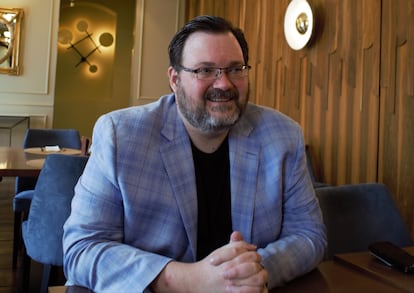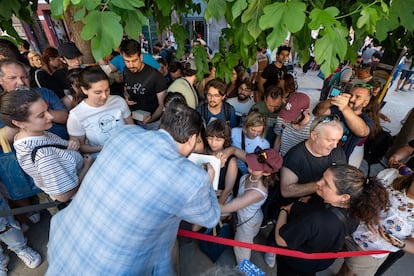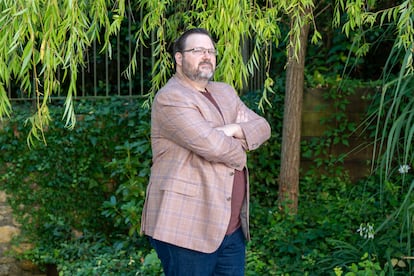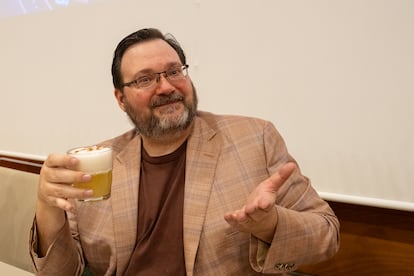Brandon Sanderson, the superstar writer with 70 people under his wing: "I hope to force Hollywood to adapt me."

The uniqueness of American writer Brandon Sanderson (Lincoln, Nebraska, 49) is that he has approached literature with the mentality of George Lucas . A 70-person company allows him to publish card games, role-playing games, pins, and deluxe editions of his works. He also approaches the writing of each novel as if it were a pre-production for a film or video game, with a river of concept art illustrations to visualize the worlds he explores and to draw on the ideas of a large team of artists.
The writer burst onto the fantasy scene by agreeing to complete Robert Jordan's The Wheel of Time saga , which remained unfinished at the time of his death. Although he has written works outside of his larger, connected universe, the Cosmere, this is his most popular creation, with multiple novel series such as Mistborn (seven to date) and The Stormlight Archive (five).
Brandon Sanderson is at the peak of his career, and more specifically, of his relationship with Spain. He was the star of Celsius 232 , the international festival dedicated to fantasy fiction in Avilés, now in its 14th year. And he left behind unusual images of queues for the big new development he unveiled: his first exclusive merchandising store in Europe. But this is only the beginning for an author with more than 42 million readers worldwide and more than a million and a half in Spain who wants to change the publishing industry forever.
Now he's about to fulfill a dream. Finally, he's arrived at the saga that will allow him to complete a challenge that has obsessed him: to tell a grand narrative cycle. that began in medieval fantasy and underwent two industrial revolutions to end in a science fiction setting. That cycle is Mistborn . It takes place at the Meliá Hotel in the Asturian city.
Question: How do you feel?
Answer: It's wonderful. I've been waiting for this for so long... I called my editor with this idea in 2004. That means it's taken me 21 years to get around to it. And, as someone who loves seeing plans come to fruition, it's been extraordinarily satisfying. It's also been a very easy book to write because I had it completely planned, and it comes so naturally.
Q. You return to the planet Scadrial, which hosted your first major publishing success, the first Mistborn trilogy.
A. There's a mix of pleasure and doubt. How can I make it different this time? What's changed? So I sat down with my team and asked them to start producing concept art. To investigate the real science behind the ideas I wanted to explore. And this has been tremendous fun because now I have a great team, so we can produce a veritable torrent of concept art.

Q: This is one of the things that has changed since your last visit to Celsius. The size of your company and how you've decided to follow the creative process of film and video games to pre-produce a novel.
A. I now have a human resources department. It's not something I had anticipated. But the publishing world refused to change. So I realized that if I wanted to fulfill my dreams, I was going to have to do it myself. I increased my staff from 15 to 70 people and said, we'll do it ourselves. And it's incredible because when we meet with Hollywood, we can bring them our own concept art so they can see how we want to represent our universe. We have style guides. Authors usually don't have any of this. In fact, I'm the only one who does. Growing so much has taken its toll, of course. Now, I write four days a week, and another day I have to dedicate to my company. My wife, Emily, is the one who dedicates her entire week to our company. She's the trump card that makes Dragonsteel work.

Q. You've had tremendous success opening your first official store in Europe in this Celsius, with mile-long lines. You've had words of praise for your publishing house in Spain [ Penguin Random House's Nova imprint ], and you think the literary industry is too conservative. Now, many are talking about when you'll open a permanent store for your brand in Europe. What challenges do you want to explore in this role as a publisher and marketer?
A. I praise Nova because they met the challenge I proposed to them six years ago. Simultaneous release with us; English and Spanish at the same time. They're the only ones achieving this from my publishers around the world. And this interested me a lot because it means fans are growing, simultaneously, in the Spanish-speaking and English-speaking communities. No one has to wait. That means people aren't buying it in English as soon as it comes out; they're getting used to reading fantasy in Spanish. I want to help Spanish authors, and for my success to encourage Nova and other publishers to read Spanish writers in these genres. And, watching the Celsius program, I get the feeling we're going in the right direction, because there are many more authors than before. It's wonderful. The other leg is my strategy to be able to sell, at a reasonable price, without customs duties, my luxury books and other products in Europe. Right now, as we speak, Emily is trying to unblock a shipment of products at a customs office. So this is...
Q. A test.
A: Yes. It's a test to see if the public wanted this. They clearly want it. And so do we. We want, when we do a Kickstarter [a form of crowdfunding through which Sanderson has raised more than $40 million], a European distributor to deliver our products to our fans here. Every step we take brings us closer to that goal.

P. Joe Abercrombie , the other major epic fantasy author at this Celsius festival, told us that the festival has entered a somewhat bittersweet phase for you. You can no longer walk around freely without being surrounded by fans. In fact, this is the first time you've come with your own security.
A. Well, well, you can't complain too much [laughs]. Everyone asks me all the time when my movies and video games are coming out. And he's signed with... James Cameron ? [laughs]. I gave up on having a completely normal life a long time ago, when I finished The Wheel of Time . What's happened is that now I'm recognized wherever I go. I was even stopped at the Western Wall in Jerusalem. But the benefits far outweigh the drawbacks. I haven't had to worry about money for years now. My children's education and health are secured. I'm very lucky.
Q. You're probably the only author in the world, along with video game creator Hideo Kojima , who can afford to create incredibly expensive products independently. When will there be movies and video games?
A. We'll see. We'll see. He's doing it, of course, and I enjoyed watching the Death Stranding phenomenon. It's a video game that no one else could have afforded to make. I hope to force Hollywood to adapt to me, just as he forced the video game industry to listen to him. But I don't want to do it alone. I want to have the right partner.
Q. And is that better than producing it yourself and controlling the entire process?
A. I've considered it. But, for now, I've said no. Basically, because I don't have any experience in this. I don't want to do a Kickstarter for a video game or a film and then not be able to produce them because we don't have the experience. I could put some money into it, but I'd be risking the company. Maybe, with the right partners, we'll get to the day where we can produce them ourselves. But I don't want the day to come when I suddenly find I can only write three days a week. Because then it'll be two. And then...

Q. In this epic genre, there's a tendency to address current events through a fantasy perspective. NK Jemisin details the ecological disaster. The video game Baldur's Gate 3 , the drama of displaced people. And you've decided to include a therapist, a psychologist, in an epic fantasy world in your latest novel, The Wind and the Truth . Why?
A. Stories are always about people. In fantasy, we add imagery as a spice that gives flavor to what we're telling, but at the same time it dissociates you from the world. Escapism, you could call it. It allows us to talk about problems, about the sociopolitical tensions of the real world, without carrying the baggage of reality. But, really, fantasy isn't about the past, and science fiction isn't about the future. They're about now. They're about an author who wants to explore the world and understand it. Mental health became a theme in The Stormlight Archive because I wanted to specifically portray the struggles of two characters, Kaladin and Shallan, whom I've spent many years developing. I'd also like to say that we must be responsible with how we portray characters with mental health issues. Statistics say that those with schizophrenia are less likely to commit crimes. However, how are they portrayed in film and television? We must be responsible, because fiction has the power to educate or even change our worldview. That's why I want to do a good job on this particular topic.
Q. When you interrupted the interview with Joe Abercrombie one of these days to give him a high-five and schedule a dinner, that high-five was the Superman/Batman moment of this Celsius. Abercrombie claimed to feel very comfortable playing the Batman in the relationship. Although I know you're more of a Marvel fan, do you see yourself as a Superman?
A. [Laughs out loud] Well... I mean, I'm a Boy Scout . I can't deny it. And you know what? I'm from Nebraska. And what does Nebraska border? Kansas. Home of Superman . I'm fine with that. And I mean, I love Joe, I love his books, even though they kind of shock me sometimes [Abercrombie, unlike Sanderson, portrays moments of violence with great rawness].
EL PAÍS





